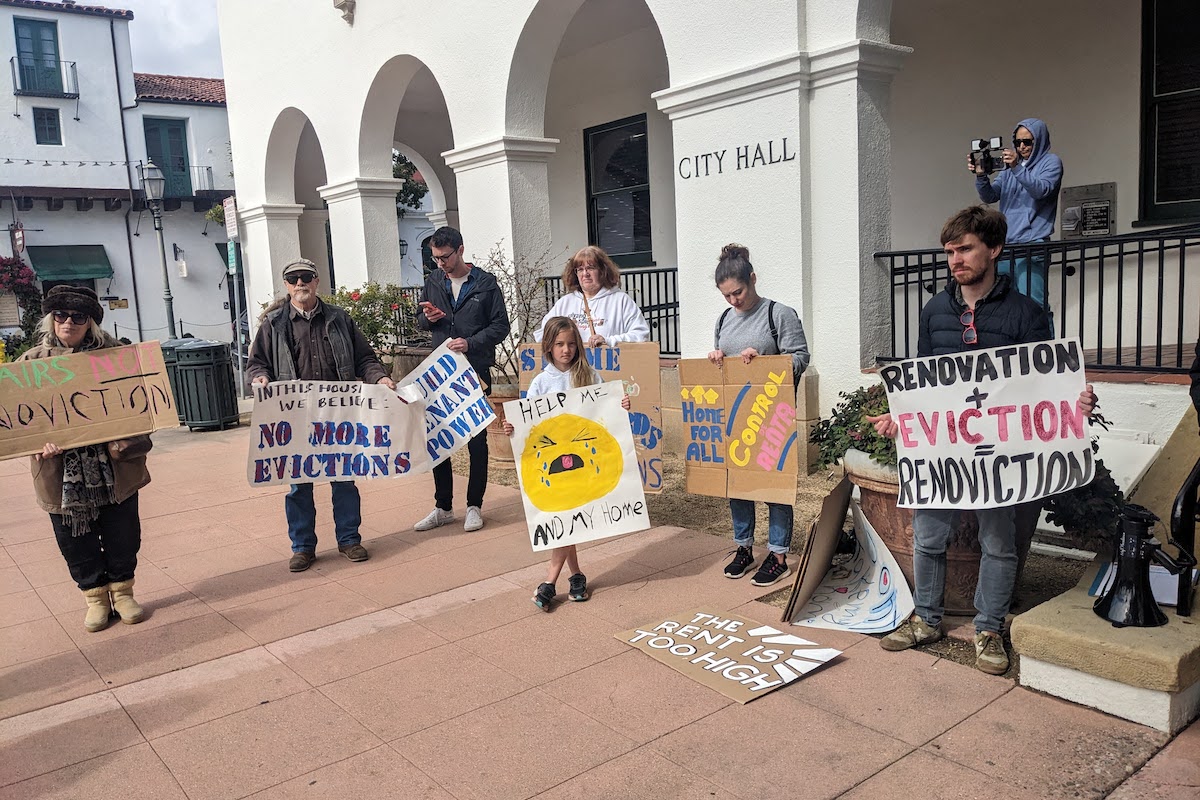Santa Barbara’s New Tenant Protections Move Forward
City Looking to Tighten Eviction Ordinance to Give Tenants Right to Re-Rent, Stop Harassment

New tenant protections earned the unanimous blessing of Santa Barbara’s ordinance committee on Tuesday and will move before the city councilmembers who will decide whether to approve the changes. The ordinance would give tenants evicted for renovations the first right of refusal and explicitly prohibit landlords from harassing tenants.
These proposed protections, meant to tighten the city’s existing eviction ordinance, are the result of the city attorney’s office working with regional housing and law advocates, including the Legal Aid Foundation, the Tenants Union (SBTU), Central Coast Alliance United for a Sustainable Economy (CAUSE), and the League of Women Voters. On Tuesday, Assistant City Attorney Dan Hentschke went over the polished ordinance, with new language added to seal possible loopholes.
At the heart of the changes would be the “right of first refusal,” allowing tenants who had been displaced to return to their renovated unit at a rent increase no higher than 10 percent. Additionally, the property owners and landlords are prohibited from any type of harassment, including pressuring tenants to leave by misrepresenting facts or threatening to use their immigration status against them.
The finalized version will be sent to the City Council early in the new year with suggested changes by advocates such as Legal Aid recommendations to place the burden of proof on the owner, ensure protections cover every step of the eviction process, and require property owners to provide notice of the exact amount of relocation assistance available.
Other small changes are common-sense provisions to stop landlords from using vague language or false information to get tenants to “self-evict.” Now if a property owner does not provide the required information in a termination notice, the notice is void.
One amendment, intended to slow the dwindling number of rentable units, would require property owners taking rental units off-market to file the notice of termination with the Community Development Director and state the intended use of the unit and lot in question.
Another addition, suggested by city councilmember and ordinance committee member Mike Jordan, would introduce a “cooling-off period” for property owners who acquire more than five rental units. If approved, this would prevent new ownership from evicting any qualified tenant or demolishing/remodeling a unit for at least a year after purchasing the property.
During public comment, members of the Santa Barbara Association of Realtors and Santa Barbara Rental Property Association raised concerns over the new tenant protections, arguing that placing a cap on rent after a remodel would adversely affect property owners’ profits and could potentially be a violation of the Costa–Hawkins Rental Housing Act.
The Costa–Hawkins Act, which was passed in 1995, protects landlords’ right to raise the rent to market rate once a tenant moves out. But in Santa Barbara’s ordinance, Assistant District Attorney Hentschke said, a tenant forced out due to a remodel would be deemed a “temporary interruption of the tenant’s right to the unit,” meaning if they wanted to re-rent the unit after the renovation it would be legally viewed as a “continuation of the pre-existing tenancy, not a termination of a tenancy.”
All three councilmembers of the ordinance committee supported the changes, with Councilmember Kristen Sneddon saying that this response is necessary in the current rental climate — where one-third of the city’s Hispanic residents have been displaced in the past five years and the average one-bedroom costs around $2,600 a month.
“I think the data is clear that these types of protections need to be in place,” she said.
Housing advocates applauded city staff for addressing the needs of residents and keeping up with similar legislation being passed throughout the state. Frank Rodriguez of CAUSE said, “I really appreciate you all for taking this on and really listening to the legal experts who are seeing firsthand what’s going on with tenants, because we want to make sure we keep tenants here housed.”
